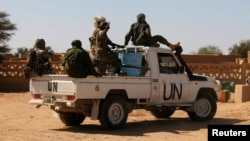In the past 15 months, more than 30 United Nations peacekeepers have been killed and 90 wounded in attacks in Mali. Drug-running and jihadism are contributing to the deteriorating security situation as the fledgling government searches for ways to consolidate a fragile peace.
Clashes, deadly attacks and the return of drug traffickers and jihadists have had a heavy impact on the security situation in northern Mali.
And the victims are increasingly the U.N. peacekeepers -- a 10,000 strong force with a mandate to protect civilians since July 2013, when Mali held elections to unite a country fractured by insurgency and a military coup.
Community leaders say that armed men have returned to their villages.
Rebels emerge
Hahadou Ag Kaoussane, the mayor of N’Tilit, a village in the Gao region, was forced to flee when gunmen claiming to be members of the separatist rebel group, the National Movement for the Liberation of Azawad (MNLA) took control of the village.
He says these men were more like “bandits and thieves” and are “not organized like the MNLA.” The mayor says since there are no soldiers in the village, they are “taking advantage of the security vacuum to return.”
The 2013 French military intervention was successful in pushing back many of the armed groups, which had taken over the northern two-thirds of the country. But as foreign troops draw down, the fledgling government has yet to take political and military control in many areas.
Malian Foreign Minister Abdoulaye Diop appealed to the U.N. Security Council last week to create a rapid reaction force to deal with the returning security threats.
Status update
U.N. peacekeeping chief Herve Ladsous visited Mali last week to assess the situation first-hand.
He says “the retreat of the Malian army from the north and the situation in southern Libya, where many of the fighters fled after being driven out of the north, and where they later regrouped, has contributed to the recent violence.” Addressing that is complicated he says, because “the groups are fragmented, you don’t know who’s affiliated with who and at the same time there are some jihadist elements."
As French forces have pulled out from some areas in the north, the U.N. mission MINUSMA is the main international presence on the ground. That makes the U.N. soldiers a target for armed groups, jihadists and traffickers who are scrambling to control the vast and largely unpopulated area.
Ladsous says a new international approach may be needed.
He says U.N. soldiers are “no longer in a peacekeeping environment but in a situation where we have to fight terrorists” -- which is not part of their capabilities under the current mandate.
All this comes as Mali’s government continues talks with various stake holders to unify the country.
Some of the rebel groups are seeking greater autonomy for parts of the secessionist-prone north.
Smuggling operations
Issa N’diaye, a professor at Bamako University, sees this demand as counterproductive to long-term peace and says the demand may be cover for power to control the transports of goods and fuel -- and illicit cargo.
He says talk of greater “independence or implementing Sharia, Islamic law, is mainly a means to secure control of important smuggling routes.”
The government has ruled out any political deals that compromise Mali’s territorial integrity or secular status.
With six armed groups involved at the third round of negotiations with members of the French and Bamako government in Algiers, the process is expected to be protracted.
One group not invited to the talks is Ansar Dine, which is designated as a terrorist organization. But the specter of it resurfacing is a shadow over the talks, says N’diaye.
He says while Ansar Dine is not part of the talks with the government they are “close to some of the groups that are participating in the talks.”
N’diaye says Mali’s long-term stability will not be solved by talks alone -- military force is a must to achieve a political solution.
The third round of talks resume in Algiers this week.




